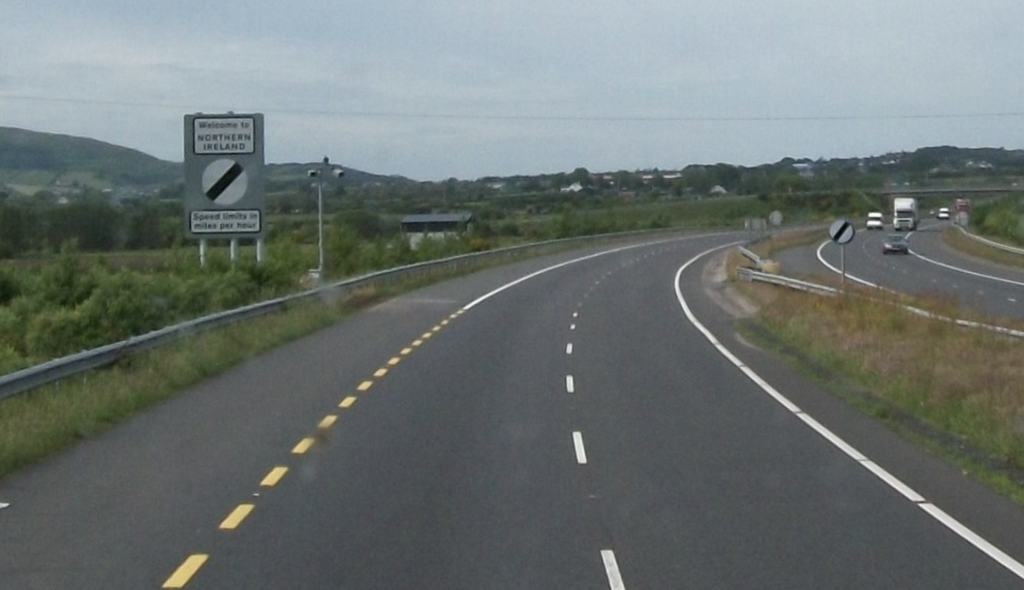THERE’S a little piece of advice that every exam taker has to take seriously.
Yet, at a recent debate in Cambridge Union, some of the best exam takers in the world ignored it.
The advice is to take the question literally, give the answer that you are asked for and not to meander off the point just to show how clever you are.
That’s what I did way back in 1967 when, in my O levels I wrote pages about books of George Orwell’s that I had read but which the examining board had not asked me about. I failed and had to resit Eng Lit.
The Cambridge students were debating the motion: This house believes the time has come for a united Ireland.
I was opposing that motion because I believe the time has not yet come to end partition and establish an all island government.
 The border at Meigh, where Co. Armagh in Northern Ireland abuts Co. Louth in the Republic of Ireland (Pic: geograph.org.uk via Wikimedia)
The border at Meigh, where Co. Armagh in Northern Ireland abuts Co. Louth in the Republic of Ireland (Pic: geograph.org.uk via Wikimedia)Many speakers from the floor and even in the proposing team said as much themselves, yet a huge majority voted for the motion.
Freelance journalist Aoife Moore led the proposition.
She gave an eloquent and exuberant account of British evils in Ireland, including the murder of her uncle by British paratroopers who fired on a civil rights parade in Derry in 1972, an event recorded as the notorious Bloody Sunday.
Aoife was supposed to have been backed up by the Sinn Féin MP for Fermanagh South Tyrone Pat Cullen but Ms Cullen, for some reason - perhaps one which should rightly evoke our compassion if we but knew - cried off.
Perhaps she had realised that supporting the motion would have been an affront to the Good Friday Agreement which her party approved and which says there can be no Irish unity until a majority in Northern Ireland endorses it.
A British withdrawal from Northern Ireland without that assent would amount to expelling two million people from the United Kingdom and would be illegal under international law.
The republicans do indeed want a united Ireland but they are not demanding an immediate border poll because they know that it would fail.
Pat Cullen was in danger of embarrassing her party in headlines the next day.
Yet she would have been heartened to see the general demand among the students for a united Ireland.
Regardless of whether it could be delivered right now or not, their sense was that it was right that it should happen some day. This was strong enough to override any quibble about the literal meaning of the motion.
And Cambridge Union students tend to do that sort of thing. They recently voted in favour of a motion that policing cannot work.
A literal interpretation of the motion would have to accept that at least on some few occasions policing can work. A constable can get an old woman safely across the road.
But no; a majority of some of the best students in the world says policing can never work.
A demand for an immediate united Ireland from people who hold such opinions has to be qualified with an understanding that they were having a bit of craic on the night and wouldn’t feel remotely accountable if the outside world took their views seriously.
And it was a great night. Aoife Moore was backed up, in the absence of Pat Cullen, by students Darragh O’Reilly, an SDLP supporter from Seskinore and Eibhlinn Hutchinson from Belfast.
I opposed after Alex Burghart, shadow secretary of state for Northern Ireland.
He said that the Good Friday Agreement provides for a referendum on Irish unity in Northern Ireland when the Secretary of State decides it is appropriate. And since both nationalist parties, Sinn Féin and the SDLP have agreed to that there really wasn’t much to discuss.
Darragh O’Reilly understood better than the rest of us that this was an occasion for showmanship and clowning, repeatedly calling out points of order, even points of order on points of order.
The night itself was enjoyable. The young debaters and members of the union turned out in dinner jackets and dickie bows but I was comfortable among them in tweed jacket and polo neck and no one said I had affronted their customs.
Three years ago at a similar debate, against Jeffrey Donaldson, Sinn Féin’s Declan Kearney wore a blue jacket, white shirt and red tie.
On that occasion the question was simply whether Northern Ireland should remain part of the UK. The vote was 92 ayes, 119 noes and 109 abstentions.
At our debate last week there were 146 ayes, that the time has come for a united Ireland, with only 22 against and over sixty abstentions.
I’m struck by the high number of abstentions, the students who feel they have nothing to offer the discussion other than to stay out of it.
In opposition, student Louis Goldberg and I tried to make the point that the more problematic division in Ireland is not the border but the sectarian segregation that cuts through our towns and cities, our schools and political parties.
Perhaps all those abstainers were wondering too if scrapping one divide without healing the other was just too dangerous.

